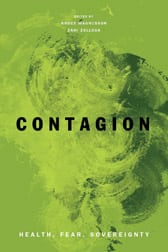 University of Washington Press
University of Washington Press
Over many decades, “contagion” has been a metaphor of choice for everything from global terrorism, suicide bombings, poverty, immigration, global financial crises, human rights, fast food, obesity, divorce, and homosexuality. Essays examine the language of epidemiology used in the war on terror, the repressive effects of global disease surveillance, and films and novels that enact the perplexities of contagion in a global context. Fear of microbial disaster becomes a framework for larger questions about the nature and location of sovereignty and the related questions of contact and hygienic isolation, fear and invisibility, the hazards of sociability, the security of surveillance, and what a healthy security might mean. Utilizing the cross-disciplinary approach of global studies, contagion emerges as a vexed trope for globalization itself.